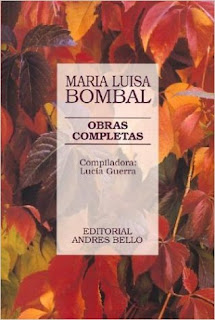by María Luisa Bombal
Argentina, 1934
While hispanistas appear to be fairly evenly divided on the loaded "was she or wasn't she a feminist?" question w/r/t to the Chilean María Luisa Bombal--a question perhaps made more complicated by the tabloid-style tidbit that the writer (1910-1980, above) once attempted to exact revenge on an ex-lover who had jilted her by pulling a gun out of her purse and emptying three slugs into the guy a good ten years after their break-up--the good news for Spanish Lit Month 2016 readers is that you can easily settle the matter for yourself by immersing yourself in the oneiric 40-page world that is La última niebla [The Final Mist]. For my part, I thoroughly enjoyed this artistically arresting, erotically charged but somewhat morbid introduction to the enigmatic Bombal. Despite a # of seemingly over the top plot elements having to do with a first wife who had died young, two suicide attempts by separate characters, a death by drowning, the gothic presence of an almost supernatural fog, and the female protagonist's apparent descent into madness as a revolt against the tedium of her marriage, though, the strangely down to earth voice of Bombal's unnamed narrator and the claustrophobic intensity of troubled marriage protestations like "La muerte me parece una aventura más accessible que la huida" ["Death seems a more accessible affair than flight"] (66) are what won me over. As an added bonus for people who care about this sort of shit, I have it on good authority that Bombal's 1938 follow-up, La amortajada [The Shrouded Woman], is even better/more compelling--and proto-feminist angle aside, might have been the novel whose mixture of living, dead and, ahem, living dead characters gave Juan Rulfo the idea for Pedro Páramo. Sweet.
La última niebla, first published as a standalone novella in Buenos Aires, appears on pages 55-95 of María Luisa Bombal's Obras completas (Santiago de Chile: Editorial Andrés Bello, 1996) compiled by Lucía Guerra. Bombal later subtantially reworked the novel into English as House of Mist. John of The Modern Novel has a review of La última niebla here, and Nicole of bibliographing has a review of House of Mist here.






Don't mess with Bombal! I've seen her name around the blogoshpehere but have never read her - this sounds like a good intro.
ResponderBorrarJacqui, the autobiographical elements in this story make me concur with you--"don't mess with Bombal!" indeed. However, I did much enjoy this long overdue introduction to her, which reminded me of some of Silvina Ocampo's best in tone and artistry. Cheers!
BorrarLa última niebla is a brilliant book so good, that even though it is not a novel, it is on my site. I would also highly recommend La amortajada (The Shrouded Woman) by Bombal
ResponderBorrarJohn, I'm happy to hear you chime in on the applause for La amortajada. Now I'll probably read it before Spanish Lit Month is out for sure. Thanks, too, for bringing my attention to your review of Bombal's earlier work. Hope it's OK, but I've added a link to your review at the end of my post. Cheers!
BorrarI'd not heard of Bombal, but am intrigued, especially by The Shrouded Woman, if that was indeed an inspiration for Rulfo (having just finished Pedro Páramo). Another for the list!
ResponderBorrarLucía Guerra connects the dots between Bombal and Rulfo in her intro to this volume, Amanda, but I guess I'll know for sure (or whatever!) after I tackle Bombal's second novella. In the meantime, I thought this debut effort was enjoyable enough in its own right--look forward to more by the author.
BorrarSounds very intriguing. The troubled life, gothic elements and general over the topness of it seems somewhat reminiscent of Du Maurier? Another name to watch out for.
ResponderBorrarI've read so little by Bombal and du Maurier that I'm hesitant to make any connections with confidence, but there do seem to be some surface similarities between the two writers (what you mention + a definite sense of style/attention to detail in both). I like Bombal better so far, though, for what little that's worth!
Borrar